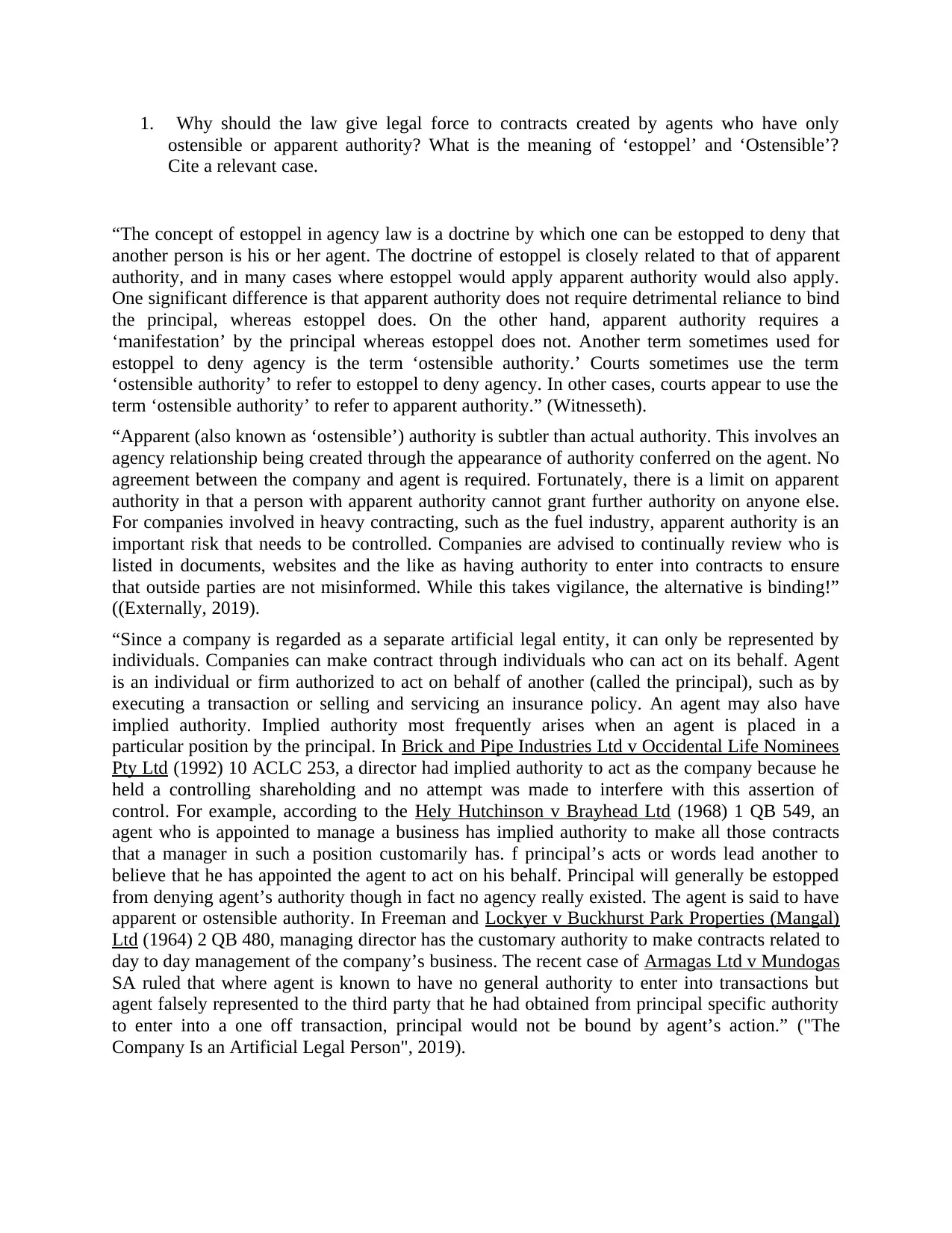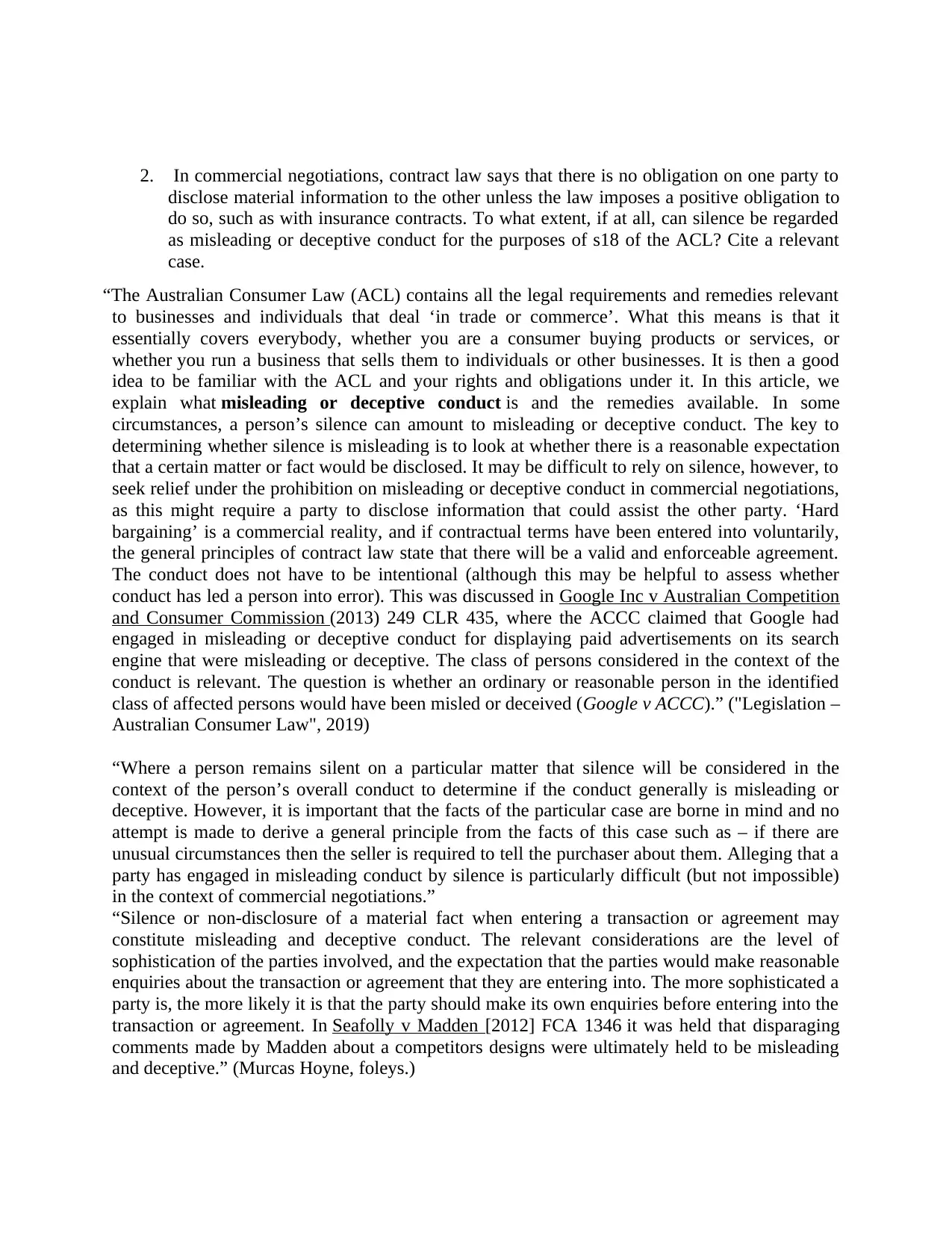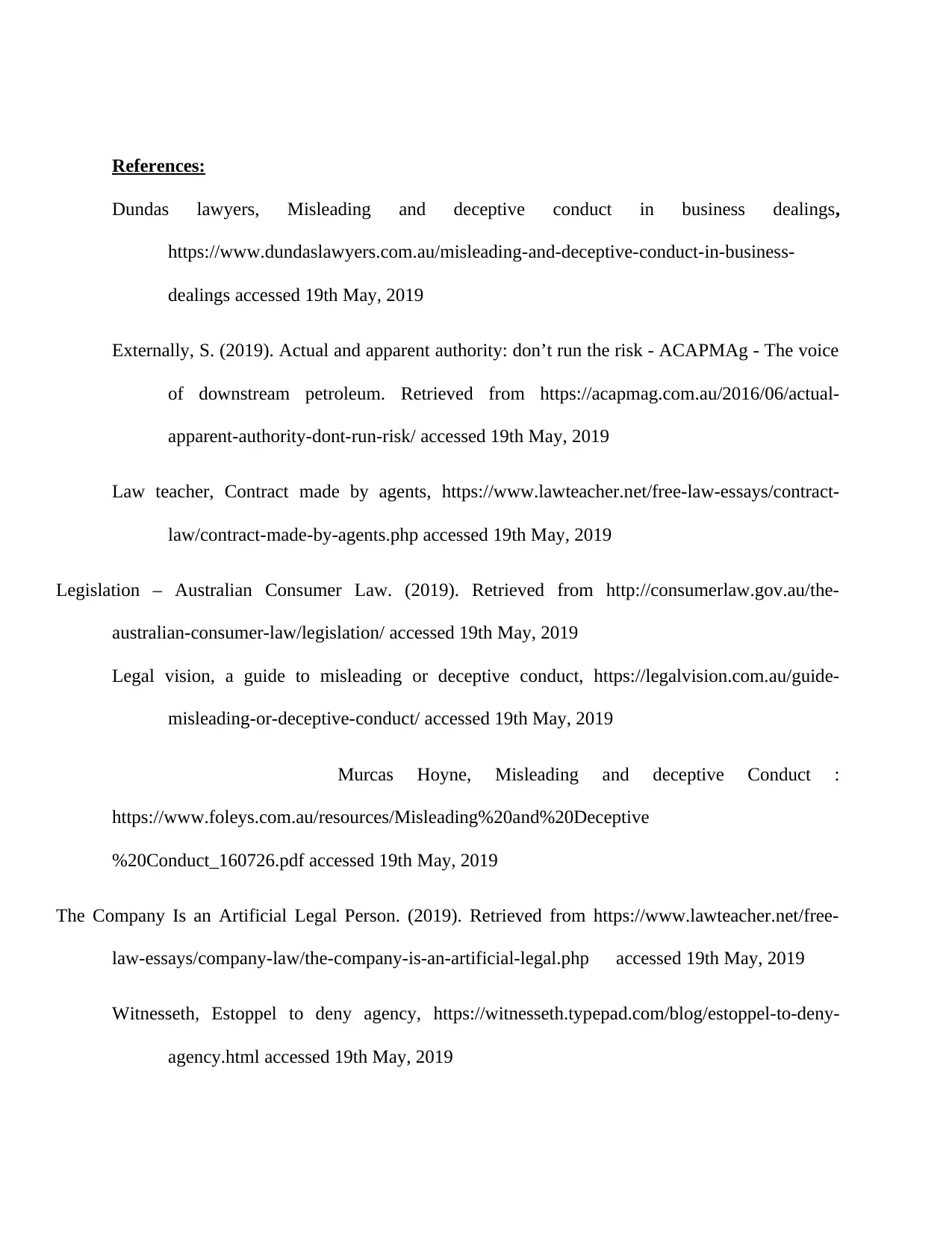Legal Force of Agency, Estoppel, and Misleading Conduct in Contracts
VerifiedAdded on 2022/11/23
|3
|1515
|65
Homework Assignment
AI Summary
This law assignment addresses two key areas of contract law: agency and misleading conduct. The first part examines why the law recognizes contracts made by agents with apparent authority, defining 'estoppel' and 'ostensible authority' and citing relevant case law like *Freeman and Lockyer v Buckhurst Park Properties (Mangal) Ltd*. The second part investigates the extent to which silence constitutes misleading or deceptive conduct under s18 of the Australian Consumer Law (ACL), referencing the case of *Google Inc v Australian Competition and Consumer Commission* and other relevant legal principles. The assignment explores the complexities of commercial negotiations, focusing on the obligations of disclosure and the potential for misleading conduct through silence, considering the sophistication of parties involved and expectations of reasonable inquiries. It also explores the concept of implied authority and its application in commercial contexts. The assignment uses multiple sources to explain and analyze the legal concepts.

1. Why should the law give legal force to contracts created by agents who have only
ostensible or apparent authority? What is the meaning of ‘estoppel’ and ‘Ostensible’?
Cite a relevant case.
“The concept of estoppel in agency law is a doctrine by which one can be estopped to deny that
another person is his or her agent. The doctrine of estoppel is closely related to that of apparent
authority, and in many cases where estoppel would apply apparent authority would also apply.
One significant difference is that apparent authority does not require detrimental reliance to bind
the principal, whereas estoppel does. On the other hand, apparent authority requires a
‘manifestation’ by the principal whereas estoppel does not. Another term sometimes used for
estoppel to deny agency is the term ‘ostensible authority.’ Courts sometimes use the term
‘ostensible authority’ to refer to estoppel to deny agency. In other cases, courts appear to use the
term ‘ostensible authority’ to refer to apparent authority.” (Witnesseth).
“Apparent (also known as ‘ostensible’) authority is subtler than actual authority. This involves an
agency relationship being created through the appearance of authority conferred on the agent. No
agreement between the company and agent is required. Fortunately, there is a limit on apparent
authority in that a person with apparent authority cannot grant further authority on anyone else.
For companies involved in heavy contracting, such as the fuel industry, apparent authority is an
important risk that needs to be controlled. Companies are advised to continually review who is
listed in documents, websites and the like as having authority to enter into contracts to ensure
that outside parties are not misinformed. While this takes vigilance, the alternative is binding!”
((Externally, 2019).
“Since a company is regarded as a separate artificial legal entity, it can only be represented by
individuals. Companies can make contract through individuals who can act on its behalf. Agent
is an individual or firm authorized to act on behalf of another (called the principal), such as by
executing a transaction or selling and servicing an insurance policy. An agent may also have
implied authority. Implied authority most frequently arises when an agent is placed in a
particular position by the principal. In Brick and Pipe Industries Ltd v Occidental Life Nominees
Pty Ltd (1992) 10 ACLC 253, a director had implied authority to act as the company because he
held a controlling shareholding and no attempt was made to interfere with this assertion of
control. For example, according to the Hely Hutchinson v Brayhead Ltd (1968) 1 QB 549, an
agent who is appointed to manage a business has implied authority to make all those contracts
that a manager in such a position customarily has. f principal’s acts or words lead another to
believe that he has appointed the agent to act on his behalf. Principal will generally be estopped
from denying agent’s authority though in fact no agency really existed. The agent is said to have
apparent or ostensible authority. In Freeman and Lockyer v Buckhurst Park Properties (Mangal)
Ltd (1964) 2 QB 480, managing director has the customary authority to make contracts related to
day to day management of the company’s business. The recent case of Armagas Ltd v Mundogas
SA ruled that where agent is known to have no general authority to enter into transactions but
agent falsely represented to the third party that he had obtained from principal specific authority
to enter into a one off transaction, principal would not be bound by agent’s action.” ("The
Company Is an Artificial Legal Person", 2019).
ostensible or apparent authority? What is the meaning of ‘estoppel’ and ‘Ostensible’?
Cite a relevant case.
“The concept of estoppel in agency law is a doctrine by which one can be estopped to deny that
another person is his or her agent. The doctrine of estoppel is closely related to that of apparent
authority, and in many cases where estoppel would apply apparent authority would also apply.
One significant difference is that apparent authority does not require detrimental reliance to bind
the principal, whereas estoppel does. On the other hand, apparent authority requires a
‘manifestation’ by the principal whereas estoppel does not. Another term sometimes used for
estoppel to deny agency is the term ‘ostensible authority.’ Courts sometimes use the term
‘ostensible authority’ to refer to estoppel to deny agency. In other cases, courts appear to use the
term ‘ostensible authority’ to refer to apparent authority.” (Witnesseth).
“Apparent (also known as ‘ostensible’) authority is subtler than actual authority. This involves an
agency relationship being created through the appearance of authority conferred on the agent. No
agreement between the company and agent is required. Fortunately, there is a limit on apparent
authority in that a person with apparent authority cannot grant further authority on anyone else.
For companies involved in heavy contracting, such as the fuel industry, apparent authority is an
important risk that needs to be controlled. Companies are advised to continually review who is
listed in documents, websites and the like as having authority to enter into contracts to ensure
that outside parties are not misinformed. While this takes vigilance, the alternative is binding!”
((Externally, 2019).
“Since a company is regarded as a separate artificial legal entity, it can only be represented by
individuals. Companies can make contract through individuals who can act on its behalf. Agent
is an individual or firm authorized to act on behalf of another (called the principal), such as by
executing a transaction or selling and servicing an insurance policy. An agent may also have
implied authority. Implied authority most frequently arises when an agent is placed in a
particular position by the principal. In Brick and Pipe Industries Ltd v Occidental Life Nominees
Pty Ltd (1992) 10 ACLC 253, a director had implied authority to act as the company because he
held a controlling shareholding and no attempt was made to interfere with this assertion of
control. For example, according to the Hely Hutchinson v Brayhead Ltd (1968) 1 QB 549, an
agent who is appointed to manage a business has implied authority to make all those contracts
that a manager in such a position customarily has. f principal’s acts or words lead another to
believe that he has appointed the agent to act on his behalf. Principal will generally be estopped
from denying agent’s authority though in fact no agency really existed. The agent is said to have
apparent or ostensible authority. In Freeman and Lockyer v Buckhurst Park Properties (Mangal)
Ltd (1964) 2 QB 480, managing director has the customary authority to make contracts related to
day to day management of the company’s business. The recent case of Armagas Ltd v Mundogas
SA ruled that where agent is known to have no general authority to enter into transactions but
agent falsely represented to the third party that he had obtained from principal specific authority
to enter into a one off transaction, principal would not be bound by agent’s action.” ("The
Company Is an Artificial Legal Person", 2019).
Paraphrase This Document
Need a fresh take? Get an instant paraphrase of this document with our AI Paraphraser

2. In commercial negotiations, contract law says that there is no obligation on one party to
disclose material information to the other unless the law imposes a positive obligation to
do so, such as with insurance contracts. To what extent, if at all, can silence be regarded
as misleading or deceptive conduct for the purposes of s18 of the ACL? Cite a relevant
case.
“The Australian Consumer Law (ACL) contains all the legal requirements and remedies relevant
to businesses and individuals that deal ‘in trade or commerce’. What this means is that it
essentially covers everybody, whether you are a consumer buying products or services, or
whether you run a business that sells them to individuals or other businesses. It is then a good
idea to be familiar with the ACL and your rights and obligations under it. In this article, we
explain what misleading or deceptive conduct is and the remedies available. In some
circumstances, a person’s silence can amount to misleading or deceptive conduct. The key to
determining whether silence is misleading is to look at whether there is a reasonable expectation
that a certain matter or fact would be disclosed. It may be difficult to rely on silence, however, to
seek relief under the prohibition on misleading or deceptive conduct in commercial negotiations,
as this might require a party to disclose information that could assist the other party. ‘Hard
bargaining’ is a commercial reality, and if contractual terms have been entered into voluntarily,
the general principles of contract law state that there will be a valid and enforceable agreement.
The conduct does not have to be intentional (although this may be helpful to assess whether
conduct has led a person into error). This was discussed in Google Inc v Australian Competition
and Consumer Commission (2013) 249 CLR 435, where the ACCC claimed that Google had
engaged in misleading or deceptive conduct for displaying paid advertisements on its search
engine that were misleading or deceptive. The class of persons considered in the context of the
conduct is relevant. The question is whether an ordinary or reasonable person in the identified
class of affected persons would have been misled or deceived (Google v ACCC).” ("Legislation –
Australian Consumer Law", 2019)
“Where a person remains silent on a particular matter that silence will be considered in the
context of the person’s overall conduct to determine if the conduct generally is misleading or
deceptive. However, it is important that the facts of the particular case are borne in mind and no
attempt is made to derive a general principle from the facts of this case such as – if there are
unusual circumstances then the seller is required to tell the purchaser about them. Alleging that a
party has engaged in misleading conduct by silence is particularly difficult (but not impossible)
in the context of commercial negotiations.”
“Silence or non-disclosure of a material fact when entering a transaction or agreement may
constitute misleading and deceptive conduct. The relevant considerations are the level of
sophistication of the parties involved, and the expectation that the parties would make reasonable
enquiries about the transaction or agreement that they are entering into. The more sophisticated a
party is, the more likely it is that the party should make its own enquiries before entering into the
transaction or agreement. In Seafolly v Madden [2012] FCA 1346 it was held that disparaging
comments made by Madden about a competitors designs were ultimately held to be misleading
and deceptive.” (Murcas Hoyne, foleys.)
disclose material information to the other unless the law imposes a positive obligation to
do so, such as with insurance contracts. To what extent, if at all, can silence be regarded
as misleading or deceptive conduct for the purposes of s18 of the ACL? Cite a relevant
case.
“The Australian Consumer Law (ACL) contains all the legal requirements and remedies relevant
to businesses and individuals that deal ‘in trade or commerce’. What this means is that it
essentially covers everybody, whether you are a consumer buying products or services, or
whether you run a business that sells them to individuals or other businesses. It is then a good
idea to be familiar with the ACL and your rights and obligations under it. In this article, we
explain what misleading or deceptive conduct is and the remedies available. In some
circumstances, a person’s silence can amount to misleading or deceptive conduct. The key to
determining whether silence is misleading is to look at whether there is a reasonable expectation
that a certain matter or fact would be disclosed. It may be difficult to rely on silence, however, to
seek relief under the prohibition on misleading or deceptive conduct in commercial negotiations,
as this might require a party to disclose information that could assist the other party. ‘Hard
bargaining’ is a commercial reality, and if contractual terms have been entered into voluntarily,
the general principles of contract law state that there will be a valid and enforceable agreement.
The conduct does not have to be intentional (although this may be helpful to assess whether
conduct has led a person into error). This was discussed in Google Inc v Australian Competition
and Consumer Commission (2013) 249 CLR 435, where the ACCC claimed that Google had
engaged in misleading or deceptive conduct for displaying paid advertisements on its search
engine that were misleading or deceptive. The class of persons considered in the context of the
conduct is relevant. The question is whether an ordinary or reasonable person in the identified
class of affected persons would have been misled or deceived (Google v ACCC).” ("Legislation –
Australian Consumer Law", 2019)
“Where a person remains silent on a particular matter that silence will be considered in the
context of the person’s overall conduct to determine if the conduct generally is misleading or
deceptive. However, it is important that the facts of the particular case are borne in mind and no
attempt is made to derive a general principle from the facts of this case such as – if there are
unusual circumstances then the seller is required to tell the purchaser about them. Alleging that a
party has engaged in misleading conduct by silence is particularly difficult (but not impossible)
in the context of commercial negotiations.”
“Silence or non-disclosure of a material fact when entering a transaction or agreement may
constitute misleading and deceptive conduct. The relevant considerations are the level of
sophistication of the parties involved, and the expectation that the parties would make reasonable
enquiries about the transaction or agreement that they are entering into. The more sophisticated a
party is, the more likely it is that the party should make its own enquiries before entering into the
transaction or agreement. In Seafolly v Madden [2012] FCA 1346 it was held that disparaging
comments made by Madden about a competitors designs were ultimately held to be misleading
and deceptive.” (Murcas Hoyne, foleys.)

References:
Dundas lawyers, Misleading and deceptive conduct in business dealings,
https://www.dundaslawyers.com.au/misleading-and-deceptive-conduct-in-business-
dealings accessed 19th May, 2019
Externally, S. (2019). Actual and apparent authority: don’t run the risk - ACAPMAg - The voice
of downstream petroleum. Retrieved from https://acapmag.com.au/2016/06/actual-
apparent-authority-dont-run-risk/ accessed 19th May, 2019
Law teacher, Contract made by agents, https://www.lawteacher.net/free-law-essays/contract-
law/contract-made-by-agents.php accessed 19th May, 2019
Legislation – Australian Consumer Law. (2019). Retrieved from http://consumerlaw.gov.au/the-
australian-consumer-law/legislation/ accessed 19th May, 2019
Legal vision, a guide to misleading or deceptive conduct, https://legalvision.com.au/guide-
misleading-or-deceptive-conduct/ accessed 19th May, 2019
Murcas Hoyne, Misleading and deceptive Conduct :
https://www.foleys.com.au/resources/Misleading%20and%20Deceptive
%20Conduct_160726.pdf accessed 19th May, 2019
The Company Is an Artificial Legal Person. (2019). Retrieved from https://www.lawteacher.net/free-
law-essays/company-law/the-company-is-an-artificial-legal.php accessed 19th May, 2019
Witnesseth, Estoppel to deny agency, https://witnesseth.typepad.com/blog/estoppel-to-deny-
agency.html accessed 19th May, 2019
Dundas lawyers, Misleading and deceptive conduct in business dealings,
https://www.dundaslawyers.com.au/misleading-and-deceptive-conduct-in-business-
dealings accessed 19th May, 2019
Externally, S. (2019). Actual and apparent authority: don’t run the risk - ACAPMAg - The voice
of downstream petroleum. Retrieved from https://acapmag.com.au/2016/06/actual-
apparent-authority-dont-run-risk/ accessed 19th May, 2019
Law teacher, Contract made by agents, https://www.lawteacher.net/free-law-essays/contract-
law/contract-made-by-agents.php accessed 19th May, 2019
Legislation – Australian Consumer Law. (2019). Retrieved from http://consumerlaw.gov.au/the-
australian-consumer-law/legislation/ accessed 19th May, 2019
Legal vision, a guide to misleading or deceptive conduct, https://legalvision.com.au/guide-
misleading-or-deceptive-conduct/ accessed 19th May, 2019
Murcas Hoyne, Misleading and deceptive Conduct :
https://www.foleys.com.au/resources/Misleading%20and%20Deceptive
%20Conduct_160726.pdf accessed 19th May, 2019
The Company Is an Artificial Legal Person. (2019). Retrieved from https://www.lawteacher.net/free-
law-essays/company-law/the-company-is-an-artificial-legal.php accessed 19th May, 2019
Witnesseth, Estoppel to deny agency, https://witnesseth.typepad.com/blog/estoppel-to-deny-
agency.html accessed 19th May, 2019
⊘ This is a preview!⊘
Do you want full access?
Subscribe today to unlock all pages.

Trusted by 1+ million students worldwide
1 out of 3
Related Documents
Your All-in-One AI-Powered Toolkit for Academic Success.
+13062052269
info@desklib.com
Available 24*7 on WhatsApp / Email
![[object Object]](/_next/static/media/star-bottom.7253800d.svg)
Unlock your academic potential
Copyright © 2020–2026 A2Z Services. All Rights Reserved. Developed and managed by ZUCOL.





